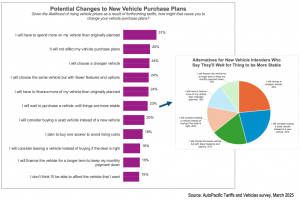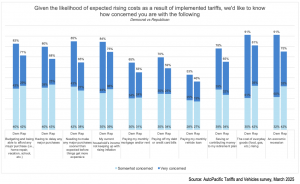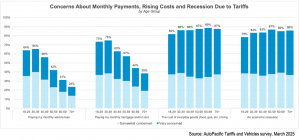
New AutoPacific Survey Reveals How Tariffs May Impact New Vehicle Buyers

20% of those intending to purchase a new vehicle will consider buying used instead of new and 23% may wait to purchase a vehicle until things are more stable.
75% of respondents who plan to purchase a vehicle within the next year will change those plans in some way if vehicle prices rise.
When asked about planned major purchases within the next year, 80% of respondents said they plan some type of large financial commitment, with vacations being the most likely purchase (44%), followed by home renovations (34%), hobbies (33%) and a vehicle purchase (33%). Of those 33% who are planning a vehicle purchase, 59% intend to purchase a new vehicle, 27% plan used and 14% are currently unsure. The big question for the automotive industry: how might those plans change if vehicle prices rise due to tariffs? “While rising vehicle prices are likely to have a negative effect on U.S. new vehicle sales, not everyone will be leaving the market,” says AutoPacific director of marketing and consumer insights, Deborah Grieb, “many still plan to make that purchase but have changed their expectations – some will simply pay more, some will choose something cheaper.”
But the real concern is the potential of movement to the used car market and purchase delays, both resulting in reduced new vehicle sales. The study reveals that 20% of those intending to purchase a new vehicle will consider buying used instead of new and 23% may wait to purchase a vehicle until things are more stable. “Consumers leaving the new vehicle market, even temporarily, would lead to devastating blows to the automotive industry, but there are options for consumers, automakers and finance companies that could keep new vehicle intenders in the market,” says Grieb. According to Experian, the average term for new car loans is 68 months, yet 15% of new vehicle intenders say they may choose to finance for a longer term to keep their monthly payment down, and 16% may shift to leasing instead of buying if they can get a good deal. Even among those who said they will wait to purchase a vehicle until things are more stable, 20% are open to leasing instead of buying, 14% are open to financing for a longer term, and 27% may choose the same vehicle they planned, but with fewer features and options. It’s also notable that 16% of new vehicle intenders said they would buy a vehicle sooner than originally planned to avoid rising costs.
Despite the Threat of Tariffs, Many New Vehicle Intenders Are Willing to Pay More…but How Much More?
There are significant numbers of new vehicle intenders who simply expect to pay more for their vehicle than originally planned, or who will finance more than planned. For those new vehicle intenders who said they will pay more than originally planned, more than half (52%) say they’ll pay $3,000-$5,000 more. For those who will finance more than originally planned, 54% will pay less than $125 per month more, with the majority (20%) saying they’ll only pay between $100-$124 more per month.
Political Leanings Don’t Impact Concerns About a Recession or Rising Costs of Everyday Goods
Republican and Democrat respondents alike say they are familiar with how tariffs work, 90% and 92% respectively, but Republican respondents are less likely to be concerned about rising costs having an impact on them personally than Democrat respondents. However, both respondent groups worry about rising costs of living and an economic recession being in their future, with the biggest concern being the higher price of everyday goods, like food, gas, etc. Republican respondents’ concerns tend to be less intense overall, being less likely to say “very concerned” to all presented scenarios and more likely to say “somewhat concerned.” Republican respondents are also less likely to change their vehicle purchase plans with 31% saying rising vehicle prices as a result of tariffs will not affect their vehicle purchase plans, compared to 21% of Democrat respondents.
Older Consumers are the Least Concerned about Tariffs
Interestingly, the older consumer groups surveyed, those age 60 and older, as well as those who are retired, have the least concern about tariffs personally affecting them. As most older consumers have likely paid off their mortgage and possibly their vehicle loan, only 39% are concerned about paying their monthly mortgage or rent compared to 73% of respondents ages 18-29. Similarly, only 24% of respondents ages 70 and older are concerned about paying their monthly vehicle loan compared to 64% of respondents ages 18-29. However, the likelihood that older respondents are on a fixed income may contribute to their concerns about the rising cost of everyday goods and an economic recession; both concerns they have in common with the younger respondents.
About AutoPacific
AutoPacific is a future-oriented automotive marketing research and product consulting firm providing clients with industry intelligence and sales forecasting. The firm, founded in 1986, also conducts extensive proprietary and syndicated research and consulting for auto manufacturers, distributors, marketers, and suppliers worldwide, including its highly recognized Future Attribute Demand Study (FADS). AutoPacific’s expertise is grounded in data, analysis, and actionable insights, offering automakers, suppliers, and key stakeholders the knowledge they need to thrive in a rapidly evolving industry. From understanding global competition and strategies to decoding consumer demand, AutoPacific empowers clients to make strategic decisions that shape the future of mobility. The company is headquartered in Long Beach, California with affiliate offices in Michigan, Wisconsin, and the Carolinas. Additional information can be found at http://www.autopacific.com.
Deborah Grieb
AutoPacific, Inc.
+1 248-219-0234
email us here
Distribution channels: Automotive Industry, Banking, Finance & Investment Industry, Business & Economy, Electronics Industry, Manufacturing
Legal Disclaimer:
EIN Presswire provides this news content "as is" without warranty of any kind. We do not accept any responsibility or liability for the accuracy, content, images, videos, licenses, completeness, legality, or reliability of the information contained in this article. If you have any complaints or copyright issues related to this article, kindly contact the author above.
Submit your press release

